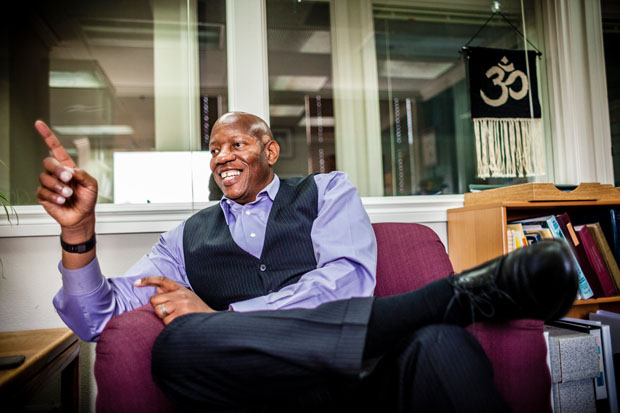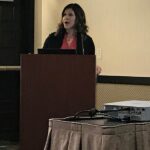BY LINDA BAKER
A longtime technologist and entrepreneur, Dwayne Johnson, 53, is managing partner of PDXO/GlobeThree Ventures, a strategy and business consultancy in Portland.
BY LINDA BAKER
Dwayne Johnson, 53, is managing partner of PDXO/GlobeThree Ventures, a strategy and business consultancy in Portland. Johnson is a former chair of the Oregon Small Business Advisory Council. He is a member of the Oregon STEM Investment Council and the Oregon Business Plan Steering Committee. Last year Johnson cofounded ScaleUp Partners, a firm that builds “inclusive innovation ecosystems.”
We ask him what that means.

The theory
Inclusion is the ability to have everybody involved. Innovation is the ideation and creation of ideas in reality. Since it’s an ecosystem, it’s like the world around us. How do we influence all the things in our environment that allow us to be successful: everything from the buildings to the schools. How does it all fit together? So it’s about making the environment fertile for inclusion and entrepreneurship.
The practice
We just got back from Miami participating in Black Tech Week. We were paid by Code Fever Miami; they put on the event. They would like to be a global competitor in the technology space and would like to do it in an inclusive way. So they put on Black Tech Week as a way to bring people of color together.
Manufacturing 4.0
My [panel] section was on machine-to-machine/artificial intelligence: how to bring more people into the local ecosystem there. Manufacturing 4.0 is the ability to use technologies inside of a manufacturing plant that are smart; the ability of something being made to tell you: “You’re not making me right. Here’s what you need to do to fix me.” So that’s what I talked about.
Concrete example
The panel is connected to another project I’m working on through PDXO. We’re working with OSU’s project materials group on a smart goods consortium in the Pacific Northwest. I get paid by Business Oregon and ETIC [Oregon’s Engineering Technology Investment Council] through ONAMI [Oregon Nanoscience and Microtechnologies Institute]. We’re looking at how to do economic development here, for the future. My intention is to ensure there are opportunities for everyone being created from the ground up as opposed to bolting it on later.
Catalyst
I have so many different facets people aren’t quite sure how to approach me. I understand technology. I understand policy. Economic development. Psychology. Business. Startups. Investments. Nonprofits. My view is a global view. I translate other people’s language into the language people speak and figure out how to move the entire inclusion process forward. As the person who has been the only person of color in these rooms, I’d like not only not to be the only one, but I’d like to understand what the barriers are: cultural, financial or language.
A hypothetical
We have a lot of conversations with people who talk about inclusion. Fewer of them are actually willing to do something about it. And when we take action, we’re not necessarily taking action that will deliver the best results. Say you wanted to increase the number of students of color that were going through an educational environment. What would you do? Maybe hire someone of color? There are people hired who are not culturally competent to bring more people of that population into their environment. Then they are surprised at results they get.
Portland pulse
In other places there are more people who are willing and anxious to do something. The population of African Americans here is quite small. In Miami, there are quite a few folks from many different nationalities who are grappling with how they fit into the mix. There is a pressure in the population to have something happen and that creates opportunity for us to work.
Untapped opportunity
There are a wealth of businesses that never see the light of day. Because the people who typically sit at the table don’t understand; the business doesn’t make sense. The whole idea that someone would actually do hair extensions: Why would you do that? Whereas if you know who is buying them, you know they are buying them religiously and there’s a lot of money involved.
Wish list
Success means people get it. You don’t have to explain what inclusion means. The jargon has become something they get. You don’t have to ask if you were invited to Greater Portland Inc.’s five-year planning process. They called you up and made sure it was inclusive. And, by the way, they have a process by which they tell you what’s going on in the different clusters. And, by the way, in your neighborhood there’s a school that would allow you to plug into those opportunities. You don’t have to discover this.
| ScaleUp Partners is a for-profit spinoff of America 21, a national organization launched in 2010 to help make the tech economy more diverse. ScaleUp partner Mike Green was one of the founders of America 21 (See “The Divide,” July/August 2012.) |
Grand vision
I have an idea for a national campaign: What would it look like if you did innovation and entrepreneurship like football and the Super Bowl? Every city has its own competition. These get rolled up into a regional and then rolled up into a national. That national ends up like the Super Bowl. I’d love to be able to create a new Google-like company out of that event every year.
Then and now
Mayor Adams was into innovation and liked to see it on his watch. Mayor Hales’ focus is more practical, more the nuts and bolts. My argument is you need to do both. But it’s hard to do both. If you’re not working on policy as well as tactical on the ground, a lot of things won’t change.
Elevator pitch
At the end of the day, there are not a lot of people like me who can help an African American company that wants to scale in tech, who has actually done it, sat in the driver’s chair, had to raise money, has been an investor, has had exits and who can say what you do next. I do it for free and for fee.
{jcomments on}



